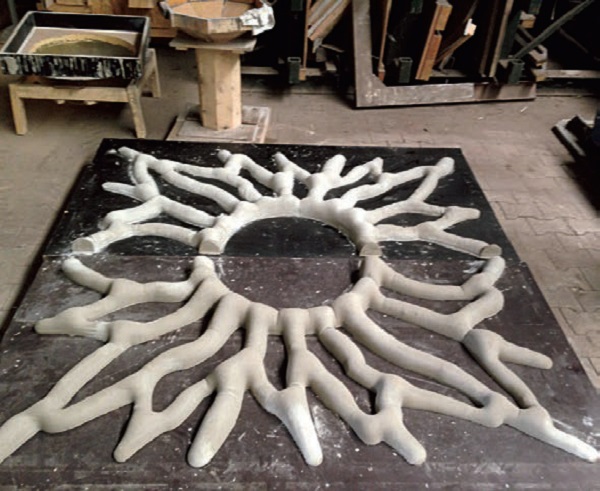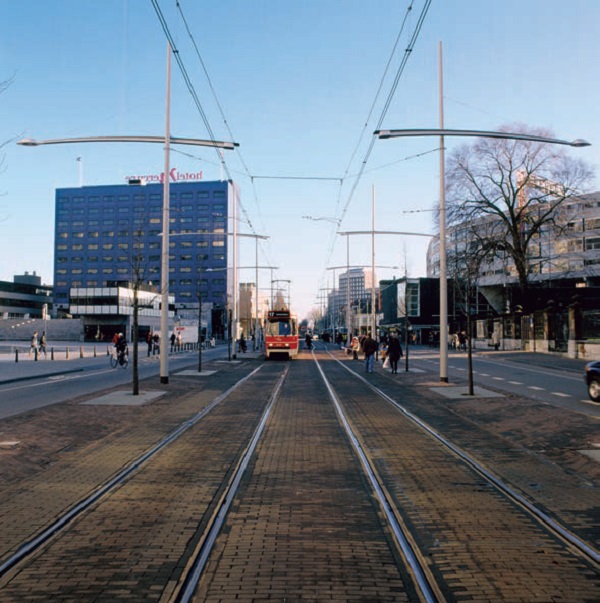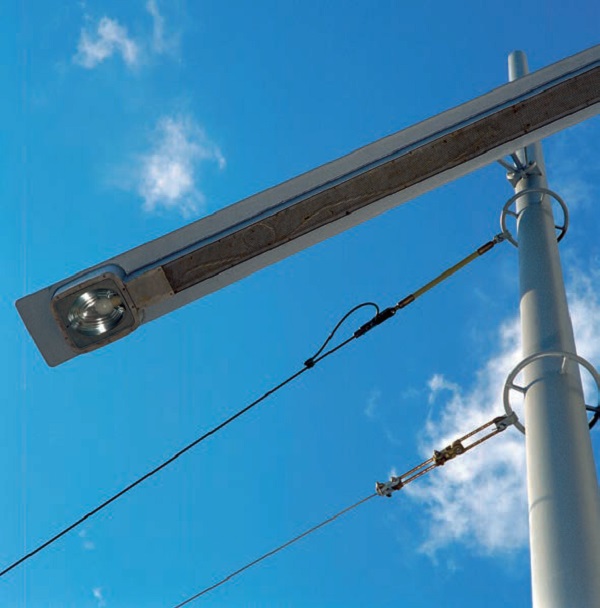The design of public spaces is multi- disciplinary by nature. Traditionally, this involved landscape architects, engineers, architects and urban designers. However, as the design of public spaces gets more importance in many countries, new professions are staking a claim to their inclusion. Artists (and sculptors) are known to be included in some design teams, as also industrial designers.

You are among the first generation of Industrial Designers to begin work in the design of Public Spaces. What was it like when you first started out?
When I started studying at the Design Academy in Eindhoven in the 1980s, the discipline of Industrial Design in the design of public spaces was in its infancy. At the Design Academy, the specialisation ‘Public Space’ had just been introduced. Prior to that, the Design Academy, which had grown in the city of Philips, was more focussed on purely Product Design and Product Presentation. With the increased interest in the 1980s in Public Spaces, the Design Academy introduced a specialisation in it. The first batch of specialists in Public Design graduated in 1991. I was part of the second batch (1992).
My interest in this specialisation was generated by my interest in not only designing an industrial product but also designing the context in which this product would be placed. Landscape Designers, the main discipline entrusted with designing public spaces, were trained to design the spaces but not design the industrial objects themselves, often ending their exercise by indicating the type they wanted and showing a reference image. My concern was to design a unique object as that would give the space a unique identity and ensure it could be efficiently produced. As Industrial Designers we also wanted to answer questions regarding the exact choice of material used, the details involved, the ergonomy of design and the method and cost of production.

Top Right: Wooden mould of manhole cover for making the sand mould
Bottom Right: First sand casting
We can see how the nature of materials and the production processes can be creatively used to create great design in the iconic example of the Revolt chair created by the legendary industrial designer Friso Kramer for Ahrend. When I spoke to Friso Kramer long ago, he explained to me how this chair was conceived in the post World War II period. He added that limited availability of materials and production techniques led to this iconic design. Steel was then available mainly as steel-sheets and the technology of folding steel sheets existed. The Revolt chair has an undercarriage made from a folded sheet steel in the form of an inverted U. The brilliance of design lies in the fact that the undercarriage, because of its limited stiffness (which in fact was the result of the constraint on material availability and production processes) has a cushioning and correcting effect. The chair has become a classic piece of design and, more than half a century later, is still in production.
So in 1992, with my interest in materials, details and production process, when I joined the design team of the well-known Dutch landscape practice of Alle Hosper as its first Industrial Designer, the inclusion of an Industrial Designer in the design team of Public Spaces was totally new.
And in the years that followed I often had to fight for a place for my discipline in the design team.

- Waterfront Lent Promenade, Nijmegen
- Staircase at the quay, view of the new secondary channel
- Parmasingel Bridge, connection of the concrete elements
- Poem stanza processed in concrete elements. Entrance to promenade
- View of the large staircase as entrance to the river park
- View from river park on construction of large staircase

Bottom Left: Open part of the water-retaining gate with inscription
Bottom Right: Assembly of the counterweight gate
Can you describe your role as an Industrial Designer in a multi-disciplinary design team and tell us about the assignments in which you acted independently to design a specific object in a public space?
A good example of my work would be ‘Space for the River Waal’ project in the city of Nijmegen, where a secondary channel in the river has been created to mitigate the effect of increased water flowing through the river due to climate change.
The design team for this vast project consisted of several landscape architects, an architect and my expertise as an Industrial Designer. While the City of Nijmegen’s landscape architect Mathieu Schouten had launched the initial ideas for the design of the banks of the new channel, I was part of the design team of the construction-consortium of Dura Vermeer and Ploegram. The design team’s task was to translate a great gesture in the landscape into bridges and banks for public use in the form of a promenade and hard and soft landscaping of the river-land interface. This was to be done in a beautiful and efficient way while bridging the several metres of differences in levels. My task was to design some of the industrially produced artefacts in this landscape, including two large steel staircases and the hard landscaped slopes of the banks in which we designed an ingenious system of concrete elements. In both these tasks we found solutions that were unique thus helping to establish the identity of this project and at the same time making it efficient.
My independent work for the Science Park in Amsterdam is another type of assignment. Here, I was asked to design a bridge at the entrance of the Science Park. The interesting aspect of this mission was that the water-management authorities wanted the bridge to also serve as a dam which, should there be a calamity, could be put into effect to stop the flow of water. I designed the bridge-deck with a slit in the middle with a brightly coloured knife-like metal element located delicately above the slit in such a way that it could be lowered by rotation to cut through the water section below it, thus preventing the flow of water from one side to the other. The red knife-like object – with the short form of the Science Park boldly written on it – not only fulfils the function of stopping the water flow in case of a calamity, but it also, under normal circumstances, acts as a large sign post for the Science Park. The inscription of the letters ‘SCIPRK’ has been incorporated in such a way that the flood barrier door is strengthened.
The design of this artefact in a public space shows how, as Industrial Designers, we are able to bring iconic value to a totally utilitarian object.
Tell me a little more about how your experiments with new materials and production techniques lead to unique design solutions.
It is when I am working on product-oriented projects for application in public spaces that my fascination with new materials and the techniques of production really shine through. Experimenting with new materials and finding new ways of working with old materials through innovative production techniques is an end in itself. This research, in collaboration with designers of other disciplines, can help us experiment with new ideas and techniques.
One of these experiments involves casting concrete using textile moulds. With this technique one can create unique and almost unpredictable shapes. Sometimes our experiments with new techniques can lead to new applications. So, for example, our experiments with using textile moulds for concrete led to the design of a unique tree-grate, which refers to the roots of the trees. We were able to get these almost-natural forms due to the use of the textile moulds.
 |  |
So as you see, in this case, experiments with disruptive production techniques led to the choice of its application in an object for the public space. Another project involved the design of a historic well in the town of Bloemendaal. While designing the forecourt of the town hall of Bloemendaal, the landscape architect discovered the existence of a historic well. I was given the task of designing a unique cover for the well which, while covering it, would also allow people to look into it. However, since the well is located in an area where service trucks drive up regularly, it had to be able to take the load of a truck. We designed a sand-moulded aluminium lid in which we used the structure of the sand casting mould as texture for the lid. The choice of this production method was based on the fact that we needed just one piece of this design. The unique, one-off design of the lid adds quality to the form of the public space.
Considering the Industrial Designer’s knowledge of industrial production processes, particularly for large scale projects, does the inclusion of an Industrial Designer lead to better design at lower costs?
An interesting example of this can be seen in our project in the design of the public space at The Spui in The Hague. This important street had to be designed in such a way that besides space for a tramline, space was also required for vehicles and of course pedestrians. This meant that while they needed masts to illuminate the streets for vehicles and also pedestrians, according to conventional design, separate masts were required to hang the electrical cables of the trams. The entire public space had the prospect of being cluttered with all sorts of masts.
The solution we suggested was to create a new series of masts that would not only have the possibility of hanging lighting armatures on two sides, but which would also function as the masts for hanging the tram cables above the tramlines. The special mast designed by us is in the form of a seamless conical tube. Additionally, together with Philips Denmark, we also designed an easy-to-produce luminaire. Our understanding of the design of public spaces combined with the knowledge of industrial design and production led not only to a less-cluttered public space but also one with fewer masts.
 |  |
With new disruptive technologies manifesting themselves, where do you see breakthroughs in the design of public spaces?
As new technologies arrive on the horizon, not only will it open possibilities for new ways to produce and design elements in public space but they will also sometimes fundamentally change the demands on the public space. For example, the use of large-scale driverless and autonomous cars will mean that we will not need any directional signs for drivers in public spaces. Lighting needs for vehicular roads might also change drastically.
New technologies of production will open new possibilities for design. I expect major steps will be taken in the coming years in the field of 3-D printing and thus production of elements in public spaces. By using 3-D printing not only will we be able to produce the products in more detail but perhaps some of the designed artefacts may be produced directly on the site itself. With the need for traditional moulds for manufacturing, unique and one-off pieces could be manufactured at reasonable costs due to 3-D printing. New forms and designs will also become possible. The project of the first 3-D printed bridge on location by Joris Laarman is an example of this.



Comments (0)